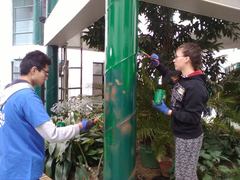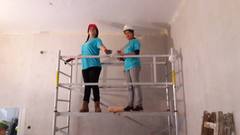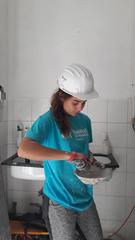



Creativity, activity, service (CAS) is one of the three essential elements that every student must complete as part of the Diploma Programme(DP). Studied throughout the Diploma Programme, CAS involves students in a range of activities alongside their academic studies.CAS enables students to enhance their personal and interpersonal development by learning through experience. It provides opportunities for self-determination and collaboration with others, fostering a sense of accomplishment and enjoyment from their work.At the same time, CAS is an important counterbalance to the academic pressures of the DP.
1: A brief guide to CAS
Creativity, activity, service (CAS) is intended to be a collection of enjoyable and challenging experiences determined by you to extend your abilities
These should involve:
2: What you have to aim at, in your CAS programme
It is not formally assessed. However, students reflect on their CAS experiences as part of the DP, and provide evidence of achieving the eight learning outcomes for CAS.
2.1 CAS Portfolio
Every CAS experience and project must be documented in your portfolio
Your portfolio should contain clear evidence of the achievement of the
7 Learning Objectives and the use of the 5 CAS Stages.
This should take the form of:
a) material evidence: certificates of completion, awards, emails, plans etc.
b) reflections which demonstrate the learning that takes place because of the experiences and projects you undertake.
Your portfolio should be personal, meaningful and represent your interests.
2.2 Learning outcomes
Through your CAS experiences, you are to achieve the following learning outcomes.



3: Structure
The three strands of CAS, which are often interwoven with particular activities, are characterized as follows:
Creativity – arts, and other experiences that involve creative thinking.
Music, theatre, film, design technology, visual arts, dance, fashion and other experiences that involve creative thinking fall under creativity (for example, joining a choir or engaging with fashion design).
Activity – physical exertion contributing to a healthy lifestyle, complementing academic work elsewhere in the DP.
Taking on a new sport or extending your ability (for example, with football, yoga, dance, aerobics classes, biking or hiking) counts as activity.
Service – an unpaid and voluntary exchange that has a learning benefit for the student. The rights, dignity and autonomy of all those involved are respected.
By investigating and identifying a community need, then determining a plan of action that respects the rights, dignity and autonomy of all involved (for example, reading to the aged or advocating for a cause), you are performing service.
In order to demonstrate these concepts, students are required to undertake a CAS Project. The project challenges students to:
CAS experiences may cover more than one strand; for example, planning sports events for disadvantaged children may involve both service and activity. Some CAS experiences may involve all three strands; for example, choreographing a performance that promotes the work of a non-profit organization involves creativity, activity and service.



4: Guideline for a successfull CAS
Note: Experiences completed as part of the requirements of the DP subjects, including theory of knowledge and the extended essay, cannot be counted as part of your CAS portfolio.



5: CAS opportunities in the school
Our school offers a variety of activities for CAS. After school clubs are part of our schools’ vivid community life. Also part of our tradition are some special days and events that help to widen students perspective and experiences.
6: Contact
CAS Coordinator: Andreasz Gadzojanisz
telephone: +36306973935
email: gadzo21@gmail.com

